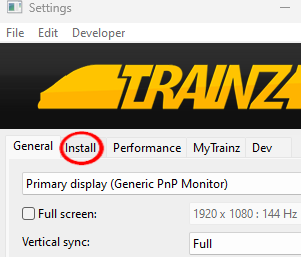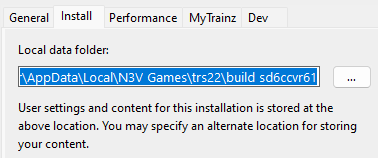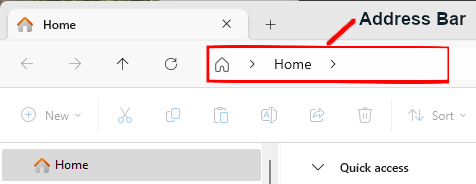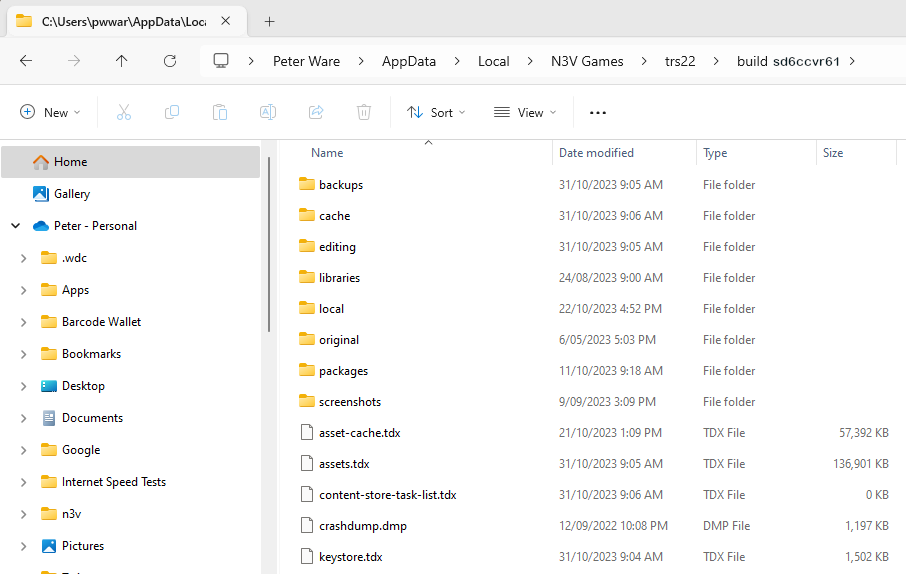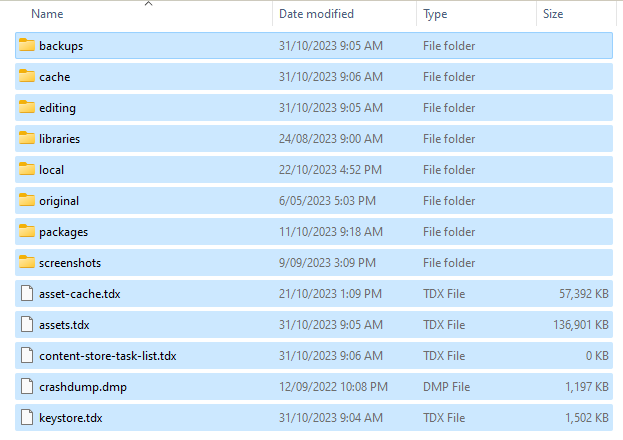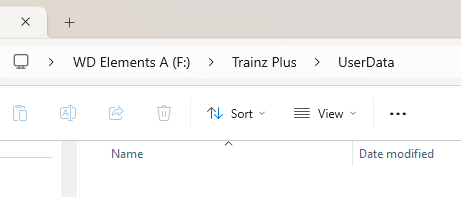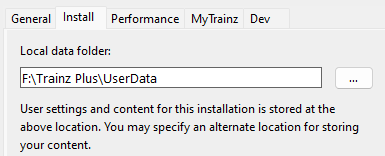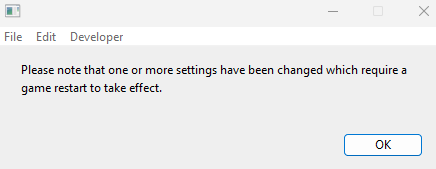How to Move Your User Data Folder
m (→Trainz Wiki) |
m (→Moving the User Data) |
||
| (4 intermediate revisions by one user not shown) | |||
| Line 34: | Line 34: | ||
<td>When you install '''Trainz''' it will default to installing the program code and the user data on the '''C:''' drive. During the install you be given the option of installing on another drive but most users will use the default.<br> | <td>When you install '''Trainz''' it will default to installing the program code and the user data on the '''C:''' drive. During the install you be given the option of installing on another drive but most users will use the default.<br> | ||
| − | As you add more data, such as '''DLC''' and '''DLS''' downloads plus create new assets (e.g. routes and sessions) of your own, the size of the '''User Data''' will grow significantly. Several '''GB''' (gigabytes) of data is not unusual for even a modest installation. Eventually, the '''C:''' drive may not be large enough to store all the Trainz data plus all the other Windows software and data.<br> | + | As you add more data, such as '''DLC''' and '''DLS''' downloads plus create new assets (e.g. routes and sessions) of your own, the size of the '''User Data''' will grow significantly. Several '''GB''' (gigabytes) of data is not unusual for even a modest installation. Some users have data sets measured in '''TB''' (terabytes). Eventually, the '''C:''' drive may not be large enough to store all the Trainz data plus all the other Windows software and data.<br> |
In this situation moving the user data to another attached drive to free up storage space may be the best option.</td> | In this situation moving the user data to another attached drive to free up storage space may be the best option.</td> | ||
| Line 56: | Line 56: | ||
<br> | <br> | ||
='''Moving the User Data'''= | ='''Moving the User Data'''= | ||
| − | + | <table width=1000 bgcolor="lightcyan" cellpadding=2> | |
| + | <tr valign="top"> | ||
| + | <td width=10>[[image:BlueDot10x10.png|link=]]</td> | ||
| + | <td>The '''User Data Folder''' (also called the '''Local Data Folder''') does not contain the '''Trainz.exe''' (e.g. '''trs19.exe, trs22.exe''') executables. These are stored in a different folder</td> | ||
| + | </tr> | ||
| + | </table> | ||
| + | <br> | ||
| + | <table width=1000 bgcolor=#ff0000 cellpadding=2> | ||
| + | <tr valign="top"> | ||
| + | <td> | ||
| + | <table width=996 bgcolor=#fcbcbc cellpadding=2> | ||
| + | <tr valign="top"> | ||
| + | <td>[[image:Stop.PNG|link=]]</td> | ||
| + | <td><span style="font-size: 15px; font-weight: 700;">WARNING:</span><br> | ||
| + | This will copy the entire '''User Data Folder''', with all its sub folders and their contents, which may contain '''Gigabytes''' (or more) of data, to a new location. You must have enough space in the destination device and allow sufficient time (possibly many hours) for the task.</td> | ||
| + | </tr> | ||
| + | </table> | ||
| + | </td> | ||
| + | </tr> | ||
| + | </table> | ||
| + | <br> | ||
<table width=1000> | <table width=1000> | ||
<tr valign="top"> | <tr valign="top"> | ||
| Line 93: | Line 113: | ||
<tr valign="top"> | <tr valign="top"> | ||
<td width=25>[[image:NotePad.PNG|link=]]</td> | <td width=25>[[image:NotePad.PNG|link=]]</td> | ||
| + | <td><span style="font-size: 17px;">'''Notes:'''</span><br> | ||
| + | ---- | ||
| + | </td> | ||
| + | </tr> | ||
| + | <tr valign="top"> | ||
| + | <td width=10>[[image:DotPoint.JPG|10px|link=]]</td> | ||
<td>Do not close the '''Trainz Launcher Settings''' window as you will need it again ('''Step''' <span style="font-weight: 700; font-size: 15px; color: white; background-color: red;"> 11 </span> below)</td> | <td>Do not close the '''Trainz Launcher Settings''' window as you will need it again ('''Step''' <span style="font-weight: 700; font-size: 15px; color: white; background-color: red;"> 11 </span> below)</td> | ||
| + | </tr> | ||
| + | <tr valign="top"> | ||
| + | <td>[[image:DotPoint.JPG|10px|link=]]</td> | ||
| + | <td>The copied address will be used to '''COPY''' the entire folder and all its content to a new location. This could involve '''Gigabytes''' of data and take some time and, of course, you must have the space available on your destnation device</td> | ||
</tr> | </tr> | ||
</table> | </table> | ||
| Line 99: | Line 129: | ||
</tr> | </tr> | ||
</table> | </table> | ||
| − | < | + | </td> |
| + | </tr> | ||
| + | </table> | ||
| + | </td> | ||
| + | </tr> | ||
| + | <tr valign="top"> | ||
| + | <td> </td> | ||
| + | <td> | ||
<table bgcolor=#000000 cellpadding=2> | <table bgcolor=#000000 cellpadding=2> | ||
<tr valign="top"> | <tr valign="top"> | ||
| Line 106: | Line 143: | ||
<tr valign="top"> | <tr valign="top"> | ||
<td>[[image:PencilTips.PNG|link=]]</td> | <td>[[image:PencilTips.PNG|link=]]</td> | ||
| − | <td>A useful tip is to paste a copy of the folder address into a text editor (e.g. '''Notepad''') for future reference. When it comes to deleting the original user data folder after the move has been completed you may find that you have several user data folders from past '''Trainz''' installs. The reference copy will identify the one to be deleted. | + | <td>A useful tip is to paste a copy of the folder address into a text editor (e.g. '''Notepad''') and save it in a text file for future reference. When it comes to deleting the original user data folder after the move has been completed you may find that you have several user data folders from past '''Trainz''' installs. The reference copy will identify the one to be deleted.</td> |
| − | + | ||
| − | + | ||
| − | </td> | + | |
</tr> | </tr> | ||
</table> | </table> | ||
| Line 115: | Line 149: | ||
</tr> | </tr> | ||
</table> | </table> | ||
| − | |||
</td> | </td> | ||
</tr> | </tr> | ||
| Line 239: | Line 272: | ||
<tr valign="top"> | <tr valign="top"> | ||
<td>[[image:MoveUserData15.png|link=]]<br><br></td> | <td>[[image:MoveUserData15.png|link=]]<br><br></td> | ||
| − | <td><br><br><br><br><span style="font-weight: 700; font-size: 15px; background-color: lightcyan;"> Left Click </span> | + | <td><br><br><br><br><span style="font-weight: 700; font-size: 15px; background-color: lightcyan;"> Left Click </span> on the [[image:OKBtn.png|link=]] button to acknowledge it.</td> |
</tr> | </tr> | ||
</table> | </table> | ||
| Line 293: | Line 326: | ||
<td>The '''User Data Folder''' in this example is named '''build sd6ccvr61'''. The letters and numbers after the '''build''' are random so yours will have its own unique name. This allows you to have multiple '''User Data Folders''' for the same install of '''Trainz''' - for example: one with all the assets installed and another with just the "built-in" and "base" assets.<br> | <td>The '''User Data Folder''' in this example is named '''build sd6ccvr61'''. The letters and numbers after the '''build''' are random so yours will have its own unique name. This allows you to have multiple '''User Data Folders''' for the same install of '''Trainz''' - for example: one with all the assets installed and another with just the "built-in" and "base" assets.<br> | ||
Once you are satisfied that everything is working correctly, you can delete the original folder ('''build sd6ccvr61''' in this example but yours will have a different name) from your system.<br> | Once you are satisfied that everything is working correctly, you can delete the original folder ('''build sd6ccvr61''' in this example but yours will have a different name) from your system.<br> | ||
| − | The parent folder is named <span style="font-weight: 700; font-size: 15px;">trs22</span> in this example. <span style="font-weight: 700; font-aize: 15px; background-color: #fcbcbc;"> DO NOT delete this folder or any of the files it contains </span></td> | + | The parent folder of '''build sd6ccvr61''' is named <span style="font-weight: 700; font-size: 15px;">trs22</span> in this example. <span style="font-weight: 700; font-aize: 15px; background-color: #fcbcbc;"> DO NOT delete this folder or any of the files it contains </span> - one of those files is used to redirect '''Trainz''' to the location of your new '''User Data Folder'''.</td> |
</tr> | </tr> | ||
</table> | </table> | ||
| Line 316: | Line 349: | ||
---- | ---- | ||
---- | ---- | ||
| + | |||
='''Trainz Wiki'''= | ='''Trainz Wiki'''= | ||
<table width=1000> | <table width=1000> | ||
| Line 325: | Line 359: | ||
<td> | <td> | ||
<span style="font-size: 17px;">'''More Tutorials and Guides to Using Trainz'''</span><br> | <span style="font-size: 17px;">'''More Tutorials and Guides to Using Trainz'''</span><br> | ||
| − | *'''<span class=" | + | *'''<span class="plain;s">[http://online.ts2009.com/mediaWiki/index.php/HowTo How to Guides]</span>''' |
*'''[[Driver Commands List]]''' | *'''[[Driver Commands List]]''' | ||
*'''[[Session Rule List with Parameters|Session Rules List (Alphabetical) with Parameters]]''' | *'''[[Session Rule List with Parameters|Session Rules List (Alphabetical) with Parameters]]''' | ||
| Line 347: | Line 381: | ||
</table> | </table> | ||
---- | ---- | ||
| − | This page was created by Trainz user '''<span class=" | + | This page was created by Trainz user '''<span class="plain;s">[http://online.ts2009.com/mediaWiki/index.php/User:Pware pware]</span>''' in November 2023 and was last updated as shown below. |
---- | ---- | ||
[[Category:How-to guides]] | [[Category:How-to guides]] | ||
Latest revision as of 10:44, 9 June 2025
The information in this Wiki Page applies to T:ANE, TRS19, Trainz Plus and TRS22. It describes how to move your user data folder to a new location.
| The User Data Folder contains all the assets that came installed with your version of Trainz plus those that you have downloaded or have created yourself. This includes all routes and sessions | |
| This folder is created when Trainz is installed and is located (in Windows) on the C:\ drive in the Users\AppData folder. The AppData folder is normally a hidden folder | |
| The folder can be moved to another location such as a different drive BUT Trainz must know where to find the new User Data Folder so the move must be performed correctly using a specific method |
[edit] Why Move the User Data Folder?
| When you install Trainz it will default to installing the program code and the user data on the C: drive. During the install you be given the option of installing on another drive but most users will use the default. As you add more data, such as DLC and DLS downloads plus create new assets (e.g. routes and sessions) of your own, the size of the User Data will grow significantly. Several GB (gigabytes) of data is not unusual for even a modest installation. Some users have data sets measured in TB (terabytes). Eventually, the C: drive may not be large enough to store all the Trainz data plus all the other Windows software and data. |
|
[edit] Moving the User Data
| The User Data Folder (also called the Local Data Folder) does not contain the Trainz.exe (e.g. trs19.exe, trs22.exe) executables. These are stored in a different folder |
|
| Steps: | ||||||||||
| 1 | Start Trainz |
|||||||||
| 2 | Open Trainz Settings From the Trainz Launcher select Trainz Settings 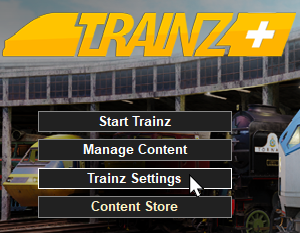 |
|||||||||
| 3 | Open Install Left Click on the Install tab 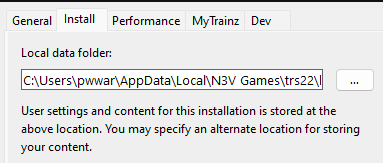 |
|||||||||
| 4 | Copy the Folder Address Left Click inside the box containing the address details then highlight and copy (press the Ctrl + A keys then the Ctrl + C keys). The address will be copied to your systems clipboard.
|
|||||||||
|
||||||||||
| 5 | Open Windows File Explorer In Windows 10 and 11 you will find the File Explorer on the Task Bar at the bottom of the screen. |
|||||||||
| 6 |
|
|||||||||
| 7 | Copy the Folders and Files Left Click on one of the items (a file or a folder) shown in the list then highlight and copy (press the Ctrl + A keys then the Ctrl + C keys) all the folders and files shown |
|||||||||
| 8 | Navigate to the New Folder Location In File Explorer navigate to the drive and/or folder where the User Data Folder will be placed.
|
|||||||||
| 9 | Paste the Copied Files and Folders into the Destination Left Click in the empty Name Display Area and paste (press the Ctrl + V keys) the copied files and folders into their new location - this may take some time depending on how much data you have. As the files and folders are copied across they will appear in the File Explorer display window. |
|||||||||
| 10 | Copy the New Folder Address Left Click in the File Explorer Address Bar then highlight and copy (press the Ctrl + A keys then the Ctrl + C keys) into your system clipboard the new folder address you created for the user data  |
|||||||||
| 11 | Paste the Address into Trainz Settings
|
|||||||||
| 12 | Close the Trainz Settings Window You will be shown a message asking for a restart.
|
|||||||||
| 13 | Close the Trainz Launcher Dropping you back to the Windows desktop. |
|||||||||
| 14 | Restart Trainz Launcher You may get a dialogue asking you to set your display options (Ultra, etc). If so select one to suit.
|
|||||||||
| 15 | Start Trainz Select the Start Trainz option from the Launcher |
|||||||||
|
[edit] Trainz Wiki
|
|
This page was created by Trainz user pware in November 2023 and was last updated as shown below.
